Key takeaways:
- Event success is defined by attendee experiences and emotional connections, not just attendance numbers.
- Setting clear goals enhances planning and can motivate teams, leading to improved event outcomes.
- Analyzing attendee feedback through surveys and themes provides insights for future event development.
- Measuring return on investment (ROI) includes both financial outcomes and the lasting impact of networking opportunities.
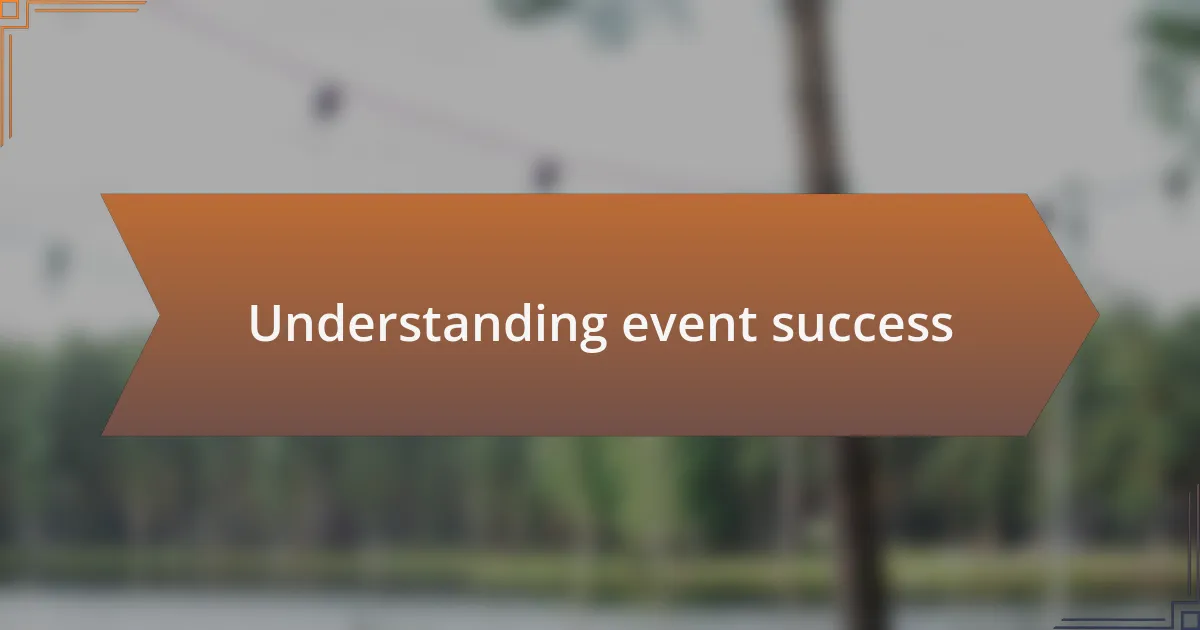
Understanding event success
Understanding event success is often more complex than just counting attendance numbers. For me, success goes beyond the metrics; it’s about the experience and impact it leaves on attendees. I remember when I organized a community festival, and although we had fewer participants than expected, the smiles and connections made that day felt incredibly rewarding.
Have you ever attended an event that changed your perspective? I have, and it’s those moments of genuine connection that I consider the true markers of success. Engaging with attendees personally and hearing their stories brought a sense of fulfillment that no number could quantify. It’s these emotional touches that often linger far longer than the event itself, reminding us that success is more than surface-level results.
Another critical aspect I focus on is the feedback received post-event. I once conducted a survey after a conference I managed, and the insights were revealing. Some attendees mentioned the networking opportunities as a highlight, illustrating that creating valuable spaces for interaction can define success just as much as the program lineup itself. By prioritizing these elements, I’ve learned to redefine event success in richer, more meaningful ways.
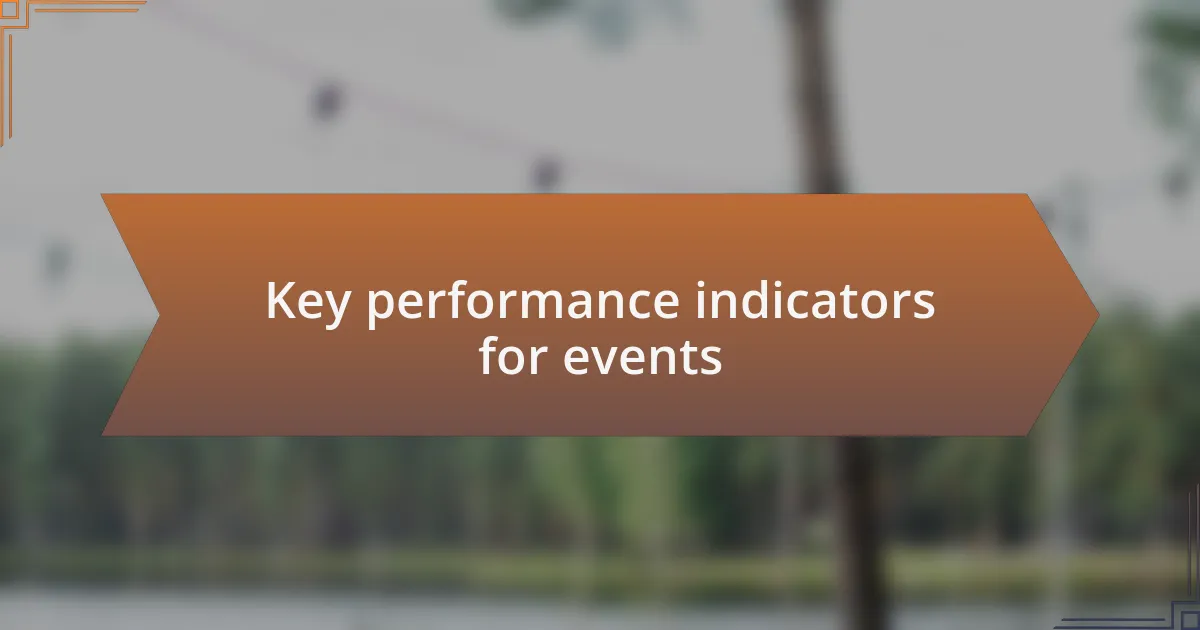
Key performance indicators for events
When evaluating event success, key performance indicators (KPIs) serve as essential tools. For instance, I often look at attendee engagement metrics, such as session participation and social media interactions. At a recent seminar, monitoring how actively participants engaged through Q&A sessions helped me gauge not just attendance but the level of interest and involvement.
Revenue generation is another crucial KPI to consider. During an annual gala I organized, I found that the total funds raised mirrored the event’s overall planning effectiveness. However, I also reflected on costs and sponsorships, which illuminated whether financial goals were met without sacrificing attendee experience. It was fascinating to see how a well-budgeted event can create a win-win scenario for both emotions and finances.
I also prioritize post-event surveys as a key indicator of success. After hosting a workshop, I was astounded to receive feedback that highlighted specific breakout sessions as transformative experiences for attendees. Have you ever organized an event and reflected on how the details made a difference? Understanding which elements resonated with attendees allows me to refine future events, ensuring that we not only meet measurable goals but also create memorable experiences.
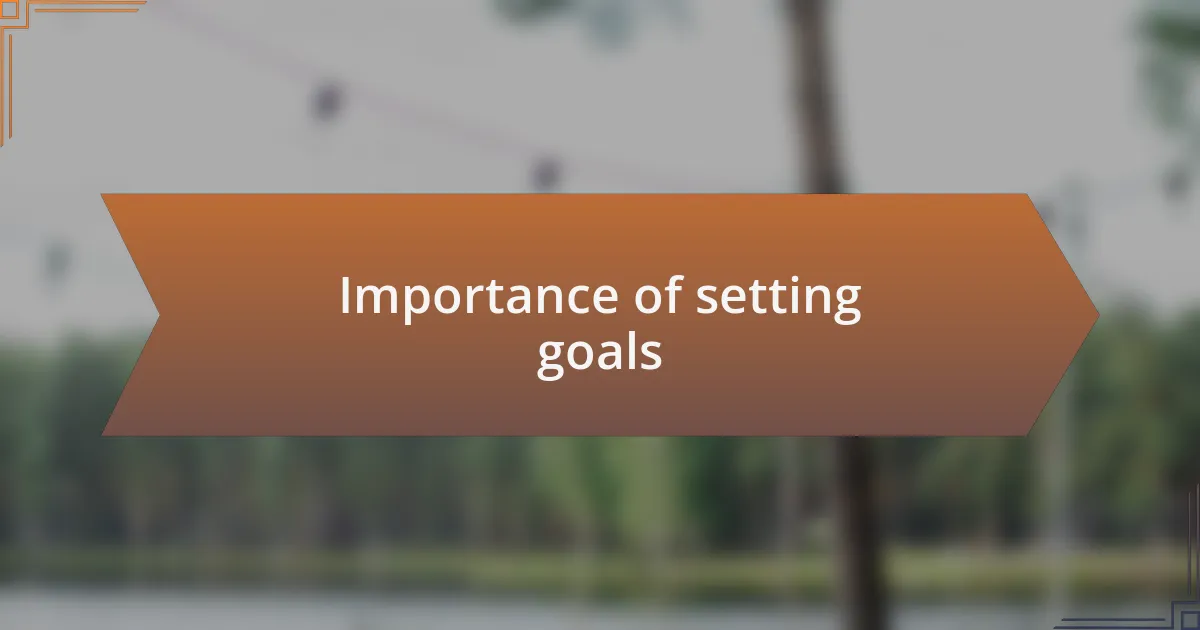
Importance of setting goals
Setting clear goals at the outset of an event is fundamental to its success. I remember planning a charity fundraiser and targeting specific revenue and attendance numbers. By having these goals in mind, I was better equipped to make decisions that aligned with achieving them, which ultimately boosted my confidence as I navigated challenges along the way.
What’s interesting is how goals can clarify the planning process. When I organized a conference, I aimed not only for high attendance but also for a diverse audience. This focus on inclusion shaped my decisions on speakers and topics, allowing me to craft an experience that resonated with a broader demographic. It’s a reminder that well-defined goals can drive creativity and innovation.
Moreover, goals serve as a motivational compass for the entire team. I recall a team meeting where we celebrated small milestones while working toward our main objectives. This collective enthusiasm bolstered morale and kept everyone engaged. Have you ever witnessed how shared goals can unify a group? It’s truly impactful.
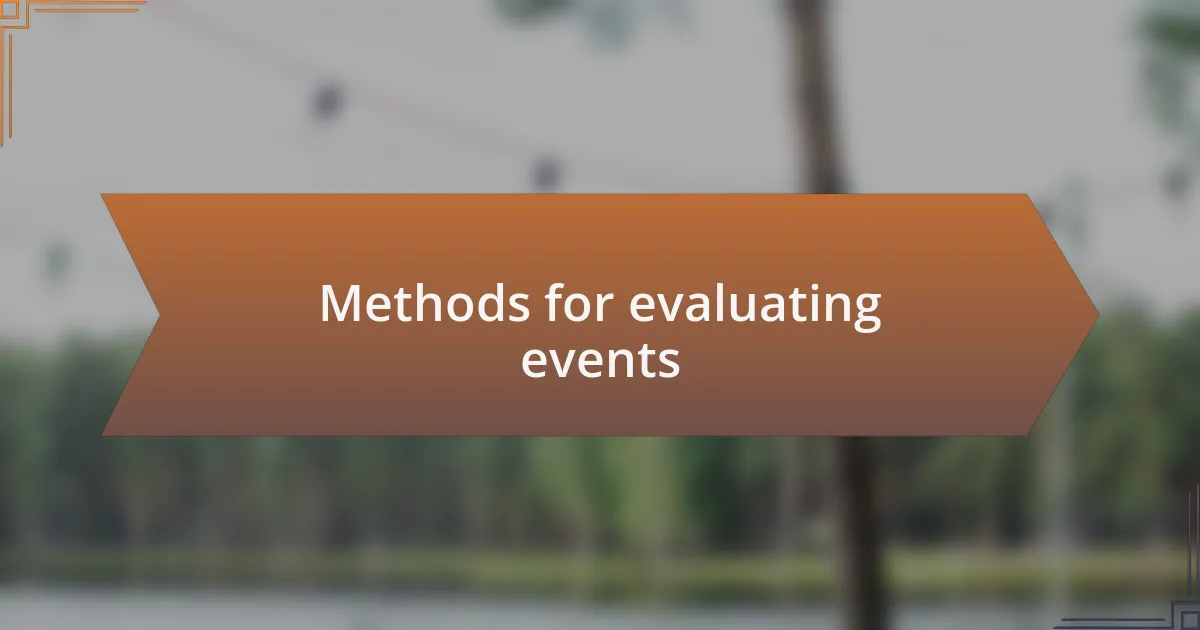
Methods for evaluating events
Evaluating event success can be approached through various methods, each providing unique insights into what worked and what didn’t. One effective method I’ve utilized is gathering attendee feedback through surveys. After a recent workshop, I distributed short questionnaires asking participants about their experiences. The responses were enlightening; they not only highlighted what aspects resonated with attendees but also revealed areas needing improvement. Have you ever been surprised by the feedback you received? It can truly reshape your future planning.
Another valuable method I often turn to is analyzing attendance and engagement metrics. I recall hosting a networking event where I tracked not only the number of attendees but also their interactions—who connected with whom and how long they stayed. This data allowed me to determine the effectiveness of the layout and timing. Do you ever consider how much information is hidden in the numbers? For me, it proved that engagement is just as crucial as attendance.
Finally, I believe in the power of post-event reflections and team debriefs. After organizing a large festival, my team and I gathered to discuss our experiences. Each person brought a different perspective, which deepened our understanding of what made the event successful. The emotions shared during this reflection reminded us of our shared journey and the lessons learned. Isn’t it fascinating how collaborative reflection can highlight both successes and areas for growth? This method can turn every event into a stepping stone for future triumphs.
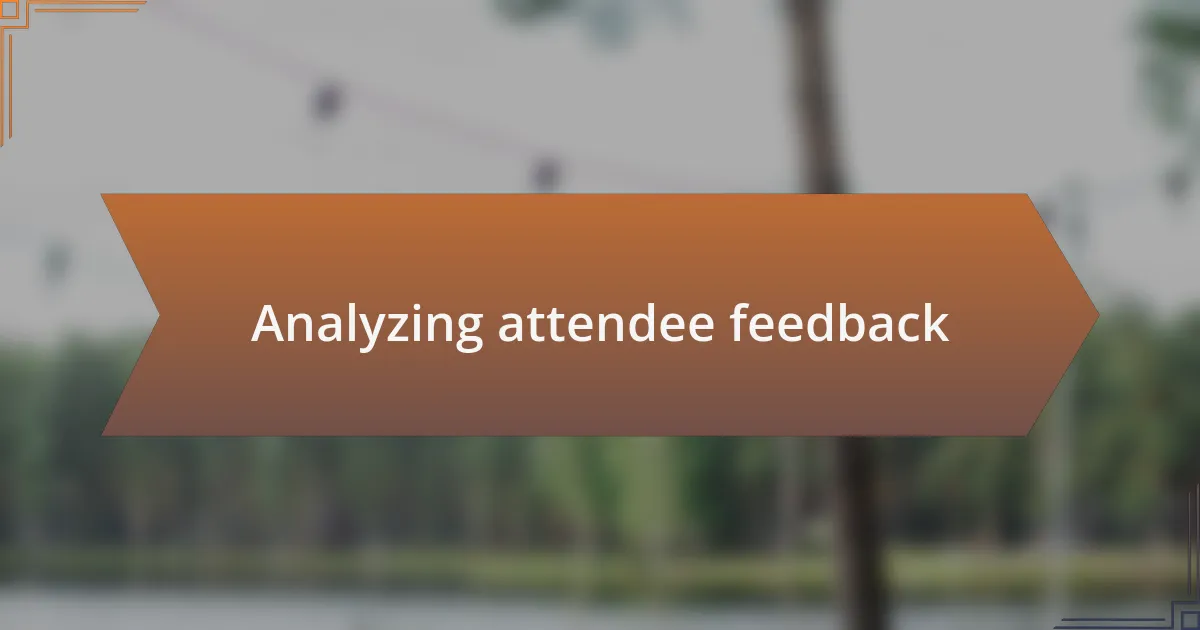
Analyzing attendee feedback
When it comes to analyzing attendee feedback, I always find that the nuances in individual comments can be incredibly revealing. Recently at a conference I organized, I received a comment that struck me: “I loved the content, but the venue made it hard to focus.” This particular feedback reminded me that even stellar content can be overshadowed by logistical issues. Have you ever faced a disconnect between what you thought was perfect and what attendees experienced? It’s moments like these that truly reshape my approach to planning.
I also make it a point to categorize feedback into themes. For instance, in a recent workshop, many participants praised the interactive sessions but noted that the pacing in the later discussions felt rushed. By grouping feedback this way, I can see patterns that paint a clearer picture of the overall experience. It’s comforting—and sometimes surprising—to realize that others share the same sentiments. Have you ever noticed recurring themes in feedback that you hadn’t considered before? Such insights pave the way for more targeted improvements.
Lastly, I find that incorporating open-ended questions fosters a richer dialogue with attendees. During a recent fundraiser, I asked participants to share their most memorable moment from the event. The responses were heartfelt and varied, from emotional speeches to unexpected connections made. This approach not only highlights what went well but also deepens my emotional connection with the audience. Don’t you think that personal stories can offer invaluable insights that numbers alone can’t provide? Each unique perspective is like a brushstroke, adding depth to the overall picture of success.
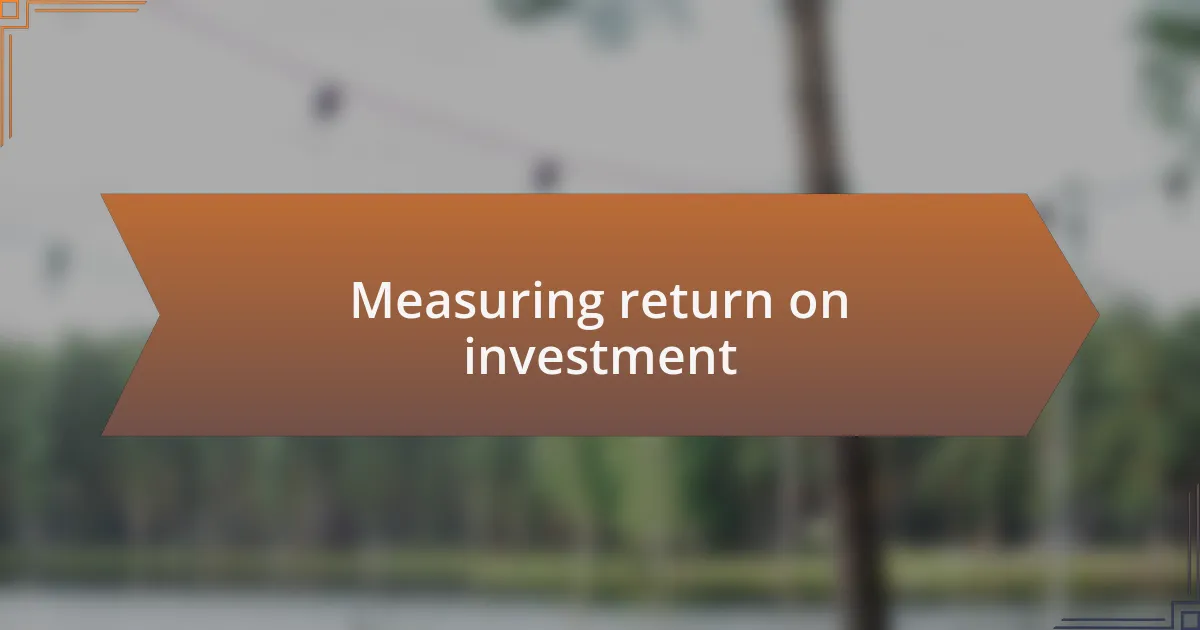
Measuring return on investment
When evaluating return on investment (ROI) for an event, I always begin by analyzing both financial and qualitative outcomes. For instance, at a recent industry conference, the ticket sales were robust, but it was the post-event networking connections that added significant value for many attendees. Have you ever considered how relationships formed at events can lead to new business opportunities, making the numerical ROI just one part of a larger equation?
In my experience, measuring ROI goes beyond straightforward profitability; it’s also about understanding the lasting impact on attendees. At my last product launch, although the immediate sales were impressive, the brand mentions and social media engagement that followed really captured the event’s influence. Isn’t it fascinating how one successful event can amplify your brand visibility and community engagement long after the last guest has left? Each interaction becomes a part of a broader narrative that showcases the event’s true value.
A crucial aspect I focus on is the conversion rates from leads generated at the event. For example, after a trade show, I followed up with contacts and found that nearly 30% of them converted into long-term clients. This outcome not only justified the investment but also reinforced the importance of relationship-building during events. Isn’t it rewarding to see how personal interactions can translate into tangible growth for your business? Each follow-up becomes an opportunity to measure success not just through numbers, but through meaningful connections formed.
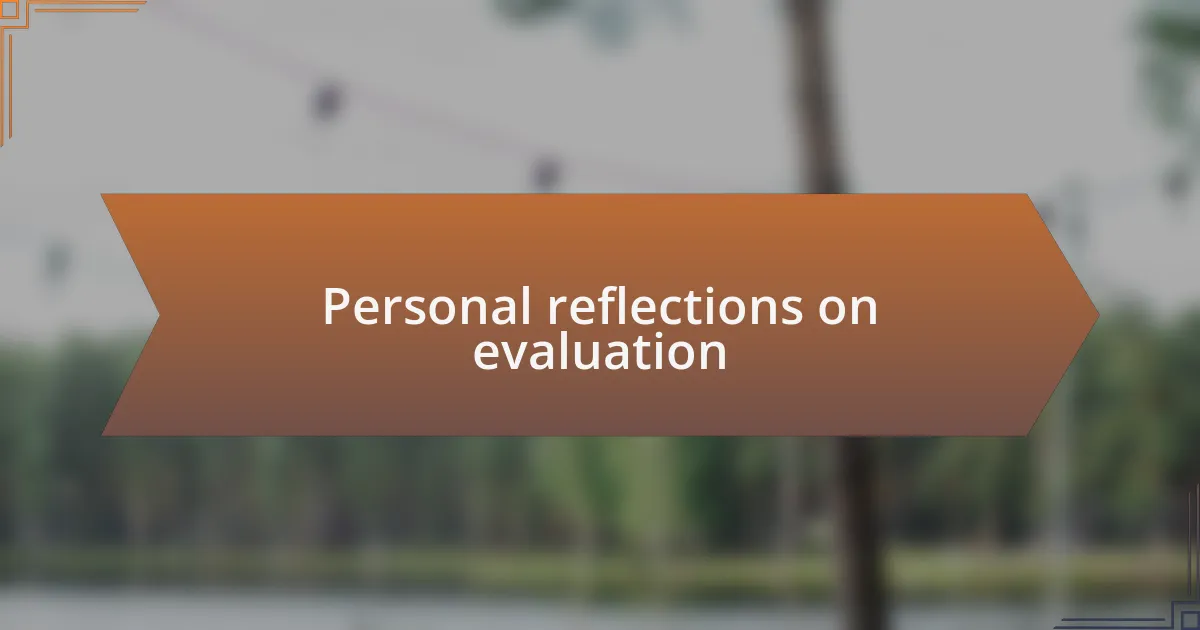
Personal reflections on evaluation
Reflecting on evaluation, I often find myself immersed in the emotions tied to each event. There’s something uniquely rewarding about seeing the faces of attendees light up during a workshop, reminding me that the true measure of success lies in shared experiences. Have you ever experienced that moment when feedback from a participant reveals the positive impact of your efforts? For me, these insights breathe life into the numbers and make my work feel genuinely purposeful.
As I delve deeper into evaluation, I notice the importance of storytelling. After one particularly successful seminar, I compiled testimonials from attendees illustrating how our discussions had inspired them to implement changes in their organizations. Each story served as a reminder of why I love this field. Isn’t it powerful to think that one event can ignite a spark that transforms a person’s approach to their work? This realization drives me to focus not just on metrics but on the human stories that provide context and meaning to those numbers.
Lastly, I’ve learned how crucial it is to embrace failure in my evaluations. One year, I organized an event that fell short of expectations, both in attendance and engagement. Instead of viewing it as a setback, I used it as a learning opportunity—gathering feedback and analyzing what went wrong. I discovered the value in vulnerability, turning those moments of disappointment into a roadmap for future success. Have you ever had a similar experience where failure taught you more than any success ever could? This journey of self-discovery and growth is what keeps me passionate about event management.